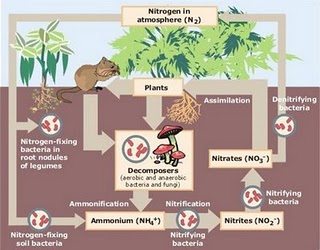The Big Word of the Month is biogeochemical. You can probably figure out the meaning if you break down the root words. Scientists use the term to refer to the processes by which chemicals like nutrients move through biological (bio) and non-biological (geology and chemical) parts of the Earth’s ecosystem.


One of the most important biogeochemical cycles is the Nitrogen cycle. Nitrogen is critical for animal and plant life because it is a constituent of proteins and nucleic acids (like DNA).Nitrogen is the most abundant element in the Earth’s atmosphere (about 80% of the air we breath). Despite its abundance, atmospheric Nitrogen is not usuable by most organisms becasue it exists in a chemically stable diatomic molecule. A small number of plants and microorganisms are Nitrogen fixers , which means they take Nitrogen from the air and turn it into other compounds. When these nitrogen fixers die and decompose or are eaten, the nitrogen compounds in their remains enter the ecosystem and can be taken up by other organisms.
The process is ongoing and if you could follow one Nitrogen atom you would see it move from living organism to the ecosystem and back again. The Nitrogen cycle includes both terrestrial and aquatic ecosystems. Here at the museum we monitor the Nitrogen cycle in our aquatic exhibits using test kits available at pet stores. Our catfish gets some dried algae pieces every day, the algae is a source of nitrogen for the fish. One of the main waste products of fish is Ammonia, a compound containing Nitrogen. Ammonia can be very toxic to fish so it is important that it is removed. Luckily, there are bacteria that love to eat Ammonia and they release a less toxic Nitrogen compound called Nitrite. Nitrite is still somewhat risky for fish but here again bacteria come to the rescue and eat the Nitrite and excrete Nitrate. In a fish tank, Nitrate can be removed by regular water changes or it will be taken by aquatic plants if present. In nature, the Nitrate is taken up by algae and plants and continues through the cycle.
Awesome post, Larry. I always feel like I’m back in college when I read your posts… they are great refresher courses for me!!